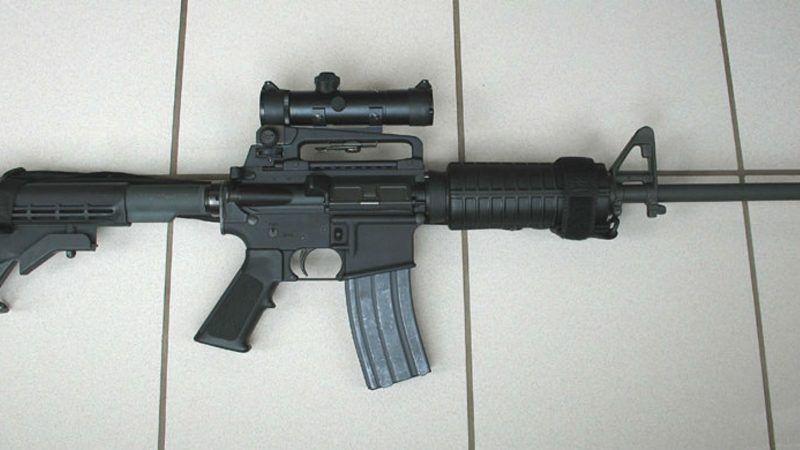4th Circuit Says 'Assault Weapon' Ban Must Pass Strict Scrutiny
The ruling suggests Maryland's law will be overturned on Second Amendment grounds.


Yesterday a federal appeals court cast doubt on the constitutionality of Maryland's "assault weapon" ban, concluding that the law imposes a "substantial burden" on the exercise of the right to keep and bear arms and should therefore be subject to "strict scrutiny." The decision, by a three-judge panel of the U.S. Court of Appeals for the 4th Circuit, sends the case back to U.S. District Court in Baltimore for consideration under that highly demanding standard. Since at least two other appeals courts have upheld bans on "assault weapons," the ruling creates a circuit split that may lead the Supreme Court to step in and resolve the issue.
Maryland's Firearm Safety Act (FSA), passed after the 2012 massacre at Sandy Hook Elementary School in Newtown, Connecticut, bans possession, sale, or transfer of 60 specific rifle and shotgun models, along with "copies" of them, a term the statute does not define. The prohibited weapons include the highly popular AR-15 rifle "and all imitations" of it as well as semi-automatic versions of the AK-47. The upshot, writes Chief Judge William B. Traxler on behalf of himself and Judge G. Steven Agee, is that the law "bans law-abiding citizens, with the exception of retired law enforcement officers, from possessing the vast majority of semi-automatic rifles commonly kept by several million American citizens for defending their families and homes and other lawful purposes." The FSA also bans the sale of magazines that can hold more than 10 rounds.
The 4th Circuit finds that the FSA "implicates the core protection of the Second Amendment—'the right of law-abiding responsible citizens to use arms in defense of hearth and home.'" In light of the Supreme Court's precedents in this area, the court says, "the burden is substantial and strict scrutiny is the applicable standard of review." Under strict scrutiny, the government must show that a challenged regulation is "narrowly tailored" to achieve a "compelling governmental interest," a test that is all but impossible to pass. It is hard to imagine how a law as frivolous as an "assault weapon" ban could survive strict scrutiny.
Traxler notes that "the conduct being regulated by the FSA includes an individual's possession of a firearm in the home for self-defense"—the right at the center of District of Columbia v. Heller (2008) and McDonald v. City of Chicago (2010), cases in which the Supreme Court overturned gun bans on Second Amendment grounds. He also points out that "the banned semi-automatic rifles are in common use by law-abiding citizens," a criterion for determining which weapons are covered by the Second Amendment. "It is beyond dispute from the record before us…that law-abiding citizens commonly possess semi-automatic rifles such as the AR-15," Traxler writes. "Between 1990 and 2012, more than 8 million AR- and AK-platform semi-automatic rifles alone were manufactured in or imported into the United States."
It is also clear that "large-capacity magazines" (LCMs) are in common use for lawful purposes. "The record in this case shows unequivocally that LCMs are commonly kept by American citizens, as there are more than 75 million such magazines in circulation in the United States," Traxler writes. "In fact, these magazines are so common that they are standard."
The court rejects the argument that the banned firearms are "dangerous and unusual" weapons, which the Supreme Court has said are not covered by the Second Amendment. All firearms are dangerous, Traxler notes, but "assault weapons" are plainly not unusual. "Semi-automatic rifles and LCMs are commonly used for lawful purposes, and therefore come within the coverage of the Second Amendment," he concludes.
The court settles on strict scrutiny as the appropriate standard of review after noting that the FSA "implicates the 'core' of the Second Amendment" (the right of armed self-defense in the home) and "substantially burden[s] this fundamental right." Contrary to what the district court concluded, Traxler says, "the fact that handguns, bolt-action and other manually loaded long guns [and] a few semi-automatic rifles are still available for self-defense does not mitigate this burden." He notes that the Supreme Court "rejected essentially the same argument in Heller—that the District of Columbia's handgun ban did not unconstitutionally burden the right to self-defense because the law permitted the possession of long guns for home defense."


Show Comments (60)